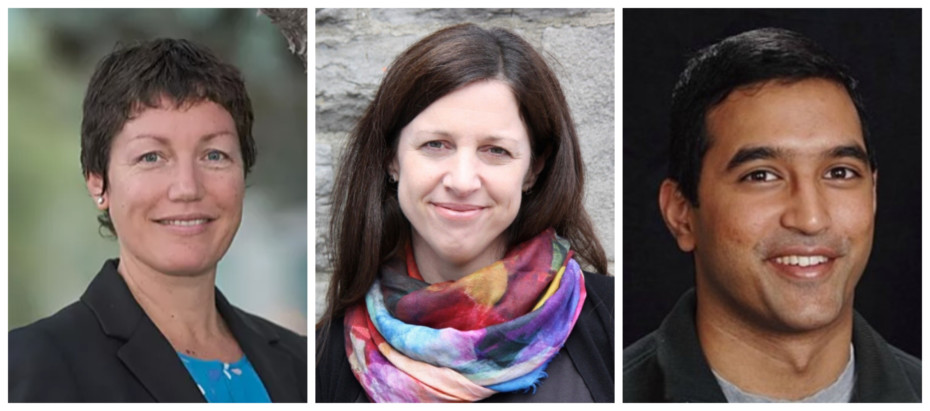
Convocation is normally a time when graduates are not only recognized for completing theirs studies, but the University’s most talented researchers are also celebrated. Indeed, this year, despite the ceremony being a virtual one due to the CoVID-19 pandemic, Principal and Vice-Chancellor Suzanne Fortier announced her selections for the Principal’s Prize for Outstanding Emerging Researchers. It is worth noting that Research and Innovation also plays a major role in the selection process.
This year’s honorees are Professor Megan Bradley (Department of Political Science), Professor Darryl Haggard (Department of Physics), and Professor Christopher Moraes (Department of Chemical Engineering).
“Although the circumstances of the presentation of this year’s award may be a bit different than normal, the quality and vision found in the work of these talented individuals represent the very best of what we, as a University, aspire to achieve,” said Principal Fortier. “I commend each of them for inspiring and motivating us to seek answers and fulfill our thirst for knowledge.”
Megan Bradley: Helping displaced people find a sense of belonging
Megan Bradley is Associate Professor of Political Science and International Development Studies. Her research agenda focuses on forced migration, humanitarianism, and human rights, coupled with critical empirical analyses of efforts to protect refugees, resolve displacement, and redress abuses. Her main interests lie in the emergence, interpretation, and application of international norms in the human rights and refugee regimes, as well as the political, legal, and moral debates associated with large-scale displacement and efforts to remedy massive injustices.
Bradley is a highly influential participant in this field and is a sought-after speaker and media commentator on this difficulty and timely subject. Her expertise is highly solicited in Canadian and international policy circles, including with Global Affairs Canada and Immigration, Refugees and Citizenship Canada, UNHCR (the UN Refugee Agency), and the Canadian House of Commons Standing Committee on Immigration and Citizenship. Bradley’s work has been instrumental in providing training to international agencies involved in displacement crises. She is renowned by her colleagues for her ability to communicate her ideas to both policymakers and lay audiences.
Darryl Haggard: Making out-of-this-world discoveries
Daryl Haggard is an Assistant Professor of Physics. Her area of inquiry is about as far from earth as one can get: the extreme endpoints for matter in the universe, more commonly known as black holes and neutron stars. Indeed, her unique drive and passion for this made these distant stellar phenomena front-page news in 2019, when her collaboration with the Event Horizon Telescope (EHT) revealed the very first image of a black hole’s event horizon silhouette (requiring a precision equivalent to photographing an orange at the distance of the Moon), an image that was shared worldwide on TV, in newspapers, and on the Internet.
Haggard is a member of the McGill Space Institute and holds a CRC Tier II (NSERC) in Multi-messenger Astrophysics. She is truly a leader in her field and an outstanding emerging researcher. Although Haggard obtained her PhD in 2010, she has published 61 manuscripts, all in high-impact, refereed journals, and in all, her work has been cited over 5,000 times. In addition to her outstanding scholarship and passion for discovery, she has an impressive record of service to both the field of astrophysics and equity and inclusion in STEM.
Christopher Moraes: Where engineering and medicine intersect
Christopher Moraes is an Assistant Professor in the Department of Chemical Engineering. His research leverages microfabrication, materials design, and stem cell tissue engineering to observe the coevolution of forces and biology as tissues develop and decay, and uses these insights to address a variety of healthcare challenges. These include designing drug screening platforms, manufacturing biotherapeutics, and identifying high‐risk patient populations.
Moraes is a prolific researcher and has published 53 articles in a variety of peer-reviewed publications. He and his group have given 50 presentations at international conferences, 22 invited seminars, and four keynote addresses. Moraes’ work has been cited over 1200 times, with an h‐index of 19. A true interdisciplinary scholar, he is the one of the very few Faculty of Engineering professors at McGill appointed as an Associate Member in Medicine.
